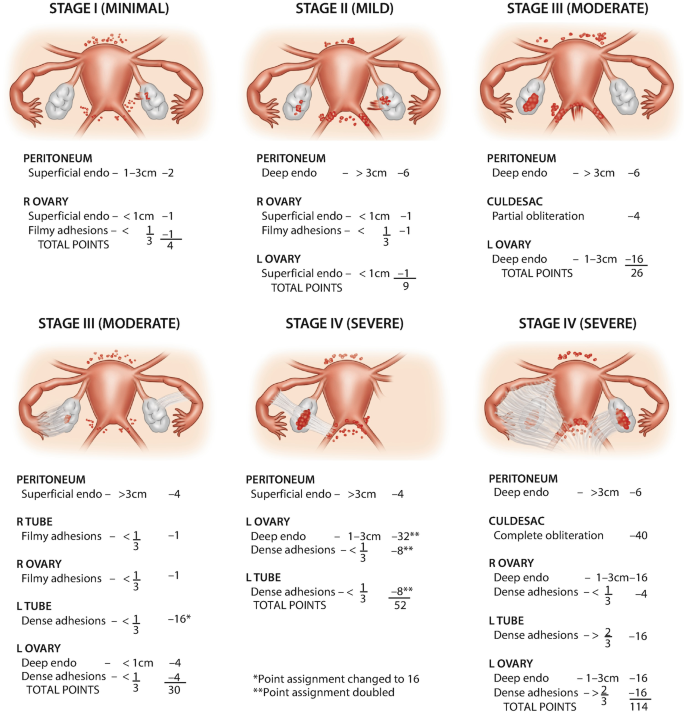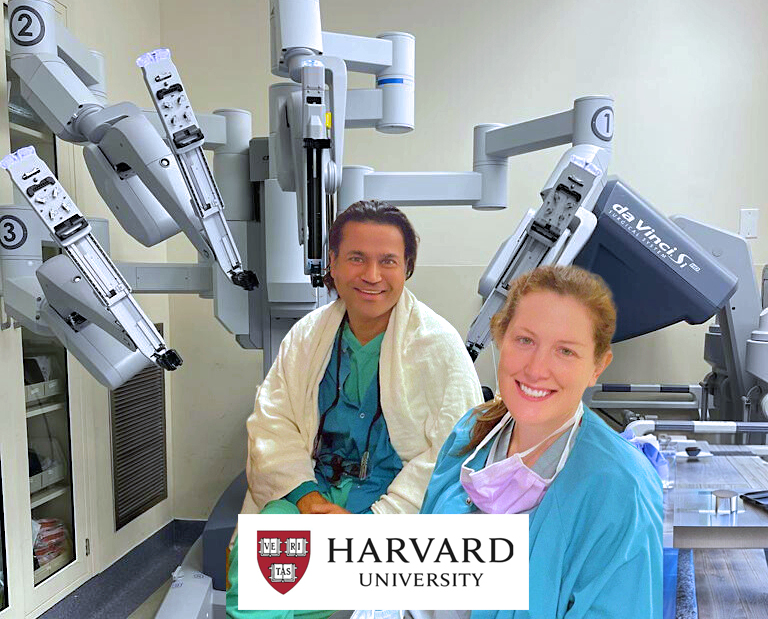第四阶段子宫内膜异位症
第四阶段子宫内膜异位症是该病最严重的阶段,其特点是广泛种植、粘连,并可能影响多个器官。
Stage 4 endometriosis is the most severe stage of endometriosis, a condition in which the tissue similar to the lining of the uterus, called the endometrium, grows outside the uterus. In stage 4 endometriosis, the implants of endometrial tissue are deeply infiltrating and widespread. These implants may be found not only in the pelvic region but also on other organs such as the ovaries, fallopian tubes, bladder, intestines, and even the diaphragm.
The severity of stage 4 endometriosis is determined by the extent of the implants and the presence of adhesions, which are abnormal bands of scar tissue that can cause organs to stick together. The implants and adhesions can lead to severe pain, inflammation, and distortion of the affected organs. Stage 4 endometriosis may also be associated with complications like ovarian cysts (endometriomas) and infertility.

子宫内膜异位症的阶段(图片来源:施普林格自然瑞士AG,2022)
Symptoms of Stage 4 Endometriosis
Stage 4 endometriosis, being the most severe stage of the condition, is often associated with a range of pronounced and debilitating symptoms. These symptoms can vary from person to person, but common manifestations of stage 4 endometriosis may include:
- Chronic Pelvic Pain: Women with stage 4 endometriosis often experience intense and persistent pelvic pain that may worsen during menstruation or intercourse. The pain may also be present throughout the menstrual cycle.
- Dysmenorrhea: Stage 4 endometriosis is frequently accompanied by severe menstrual cramps, known as dysmenorrhea. These cramps can be debilitating and may interfere with daily activities.
- Painful Intercourse (Dyspareunia): The presence of endometrial implants and adhesions in the pelvic region can lead to pain or discomfort during sexual intercourse.
- Gastrointestinal Disturbances: Endometrial implants on the intestines or other abdominal organs can cause gastrointestinal symptoms such as bloating, constipation, diarrhea, nausea, and rectal pain.
- Urinary Issues: Endometriosis affecting the bladder or ureters can result in urinary symptoms such as frequent urination, urgency, pain or discomfort during urination, or blood in the urine.
- Fatigue: Chronic pain and the impact on overall health can contribute to fatigue and a general feeling of low energy.
- Fertility Problems: Stage 4 endometriosis is associated with a higher likelihood of infertility or difficulty in conceiving due to the distortion and blockage of the reproductive organs.
It is important to note that the severity of symptoms can vary among individuals, and some women with stage 4 endometriosis may experience more or fewer symptoms than others. Additionally, the presence and intensity of symptoms may not necessarily correlate with the stage of endometriosis, as symptom severity can be influenced by various factors, including individual pain tolerance and the location of endometrial implants. Proper diagnosis and consultation with a healthcare professional are crucial for evaluating symptoms and determining the appropriate management plan for stage 4 endometriosis.
Life-threatening Complications in Stage 4 Endometriosis
Stage 4 endometriosis, as a standalone condition, is not directly linked to death. However, in rare cases, severe complications arising from stage 4 endometriosis can potentially lead to life-threatening situations. These complications are extremely uncommon, but they include scenarios such as ovarian endometrioma rupture, bowel obstruction or perforation, or kidney involvement.
In such cases, immediate medical attention and intervention are necessary to prevent life-threatening consequences. It is important to note that with proper medical management, including timely diagnosis, effective pain management, and surgical intervention when needed, the majority of women with stage 4 endometriosis can lead productive lives and successfully manage their condition.
It is crucial for individuals experiencing symptoms or concerns related to endometriosis to request an appointment with New York Gynecology Endometriosis (NYGE) for proper evaluation, diagnosis, and management to ensure the best possible outcomes.
Diagnosis of Stage 4 Endometriosis
Diagnosing stage 4 endometriosis typically involves a combination of medical history assessment, physical examinations, imaging techniques, and, in many cases, surgical exploration. Here is an overview of the diagnostic approaches commonly used:
- Medical History Assessment: The healthcare provider will start by discussing the patient’s symptoms, including the nature, duration, and intensity of pelvic pain, menstrual abnormalities, and other related symptoms. A detailed medical history helps in evaluating the likelihood of endometriosis and ruling out other possible conditions.
- Physical Examination: A pelvic examination is performed to assess the pelvic organs for any abnormalities, such as the presence of masses, tenderness, or nodules. However, it’s important to note that physical examination alone cannot definitively diagnose endometriosis.
- Imaging Techniques: Various imaging modalities may be used to support the diagnosis of endometriosis. These include:
- Transvaginal Ultrasound: This type of ultrasound is conducted by inserting a small probe into the vagina to visualize the pelvic organs. It can help detect ovarian cysts (endometriomas) and identify large endometrial growths or adhesions
- Magnetic Resonance Imaging (MRI): An MRI scan may be recommended to obtain detailed images of the pelvic region. It can help visualize endometrial implants, adhesions, and their involvement with surrounding organs.
- Laparoscopy: Laparoscopy is considered the gold standard for diagnosing endometriosis, including stage 4. It is a surgical procedure performed under general anesthesia. The surgeon makes small incisions in the abdomen and inserts a thin, lighted instrument called a laparoscope to visualize the pelvic organs directly. During laparoscopy, the surgeon can identify and classify the extent of endometrial implants, adhesions, and other abnormalities associated with endometriosis. Biopsy samples may also be taken for confirmation of the diagnosis.
It’s important to note that the definitive diagnosis of endometriosis, including stage 4, can only be made through laparoscopy and histological examination of the tissue samples obtained during the procedure.
Surgical Treatment for Stage 4 Endometriosis
Surgical treatment plays a significant role in managing stage 4 endometriosis. As the most severe form of the condition, stage 4 endometriosis often requires surgical intervention to alleviate symptoms, address complications, and improve the quality of life for affected individuals. The surgical approaches used for stage 4 endometriosis can vary depending on the specific circumstances and goals of the patient. Here are some common surgical treatments for stage 4 endometriosis:
腹腔镜切除术
Laparoscopic surgery, also known as minimally invasive surgery, is a common approach for treating stage 4 endometriosis. During the procedure, small incisions are made in the abdomen, and a laparoscope (a thin, lighted instrument) is inserted to visualize the pelvic organs. The surgeon then excises or removes the endometrial implants, adhesions, and scar tissue. Laparoscopic excision aims to alleviate pain, restore organ function, and improve fertility when applicable.
根据医疗蓝皮书,腹腔镜子宫内膜异位症切除术的费用可能因地点、医疗保健提供者和保险类型而异。平均而言,该手术的费用从 4,000 美元到 15,000 美元不等。请务必注意,这些是估计成本,可能并不反映您可能产生的实际成本。
为了获得准确的费用估算,建议请求与纽约妇科子宫内膜异位症 (NYGE) 预约。
Hysterectomy
In cases where stage 4 endometriosis is causing severe symptoms, impacting multiple organs, or if fertility preservation is not a concern, a hysterectomy may be recommended. A hysterectomy involves the removal of the uterus and, in some cases, may also include the removal of the ovaries and fallopian tubes (salpingo-oophorectomy). This surgical option can be an effective solution for managing endometriosis-related pain and reducing the risk of recurrence.
According to a report by the Healthcare Cost and Utilization Project (HCUP), the average cost of a hysterectomy in the United States ranges from $5,000 to $12,000. However, this is an average estimate and does not include additional expenses such as pre-operative consultations, lab tests, anesthesia fees, hospital stay, medications, and post-operative care.
Bowel Resection
Bowel resection is a surgical procedure that may be required in cases of stage 4 endometriosis when the endometrial implants infiltrate the intestines or cause significant complications such as bowel obstruction or perforation. This specialized surgical intervention aims to remove the affected portion of the bowel and restore normal bowel function.
In stage 4 endometriosis, endometrial implants can invade the walls of the intestines, leading to adhesions, scar tissue, and potential bowel complications. Symptoms such as severe abdominal pain, bowel obstruction, rectal bleeding, or perforation may indicate the need for bowel resection.
Bowel resection in stage 4 endometriosis requires specialized surgical skills and may involve a multidisciplinary approach with gynecologists and colorectal surgeons working together to address the complex nature of the condition.
- 进行了超过 10,000 例机器人妇科、子宫内膜异位症和癌症手术。
- 以承担其他医生/中心拒绝的最具挑战性的手术病例而闻名。
Pankaj Singhal, MD, MS, MHCM
机器人手术外科医生大师
Pankaj Singhal 博士是全球公认的子宫内膜异位症外科医生,在腹腔镜切除手术方面拥有超过 25 年的专业知识,这使他能够充满信心地应对最具挑战性的子宫内膜异位症病例。 Pankaj 医生治疗患有多种子宫内膜异位症相关疾病的患者,从卵巢子宫内膜异位症到影响肠道和其他器官的严重深部浸润性子宫内膜异位症。
Pankaj 医生优先考虑微创手术并提供全面的个人护理。此外,他还是纽约妇科和子宫内膜异位症 (NYGE) 的所有者和创始人,并一生致力于倡导、尊重和治疗患有这种鲜为人知的疾病的女性。他是全美国少数完成超过 5,718 例机器人辅助妇科手术的外科医生之一。

我们接受大多数主要保险计划
便捷的计费选项,全面覆盖。
手术通常由健康保险承保。然而,承保范围可能会有所不同,具体取决于具体的保险计划和保单。一些保险计划可能涵盖广泛的外科手术,包括选择性和必要的手术,而其他保险计划可能对某些手术有限制或排除。
在某些情况下,某些保险计划或计划可能会全额承担手术费用,使患者无需承担经济责任。
听取我们客户的意见

Leslie Patriarco
NYGE 确实改变了我的生活。我之前在纽约市的一家知名医疗服务提供者那里接受过花费 15k 的子宫内膜异位症手术,这对我来说需要 6 小时的车程,两年后才需要再次手术。
医生们从切除能力和对疾病的理解,到手术技巧,再到病人护理,都非常优秀,知识渊博。我距离手术还有 6 周时间,他们仍然会检查我并回答我的任何和所有问题。
我非常感激能找到他们。

Josie Beck
Singhal 医生是一位了不起且优秀的医生!他解释得很彻底,很友善,而且对待病人的态度非常好!他向我保证并安慰了我的手术过程以及我的选择。
花时间回答我所有的问题和疑虑。他的员工也很优秀。回电话,并随时回答问题。见到他从来不用等很长时间。
他确实是最好的外科医生和医生之一!我强烈推荐他!!

Merari Mejia
Singhal 医生和 McLean 医生是非常彻底且知识渊博的外科医生。他们对我的两次手术设定了明确的期望。 Singhal 医生和 McLean 医生为我进行了第四期子宫内膜异位症手术。
手术切口非常小,几乎不易察觉。手术缓解了我正在经历的胃肠道症状,例如排便疼痛、腹胀和腹胀。
我强烈推荐他们给任何需要他们专业知识的人。
请求预约
New York Gynecology Endometriosis
"*" indicates required fields
